The Perception of Ngozi Town Elites towards UPRONA Political Party in 2021 ()
1. Introduction
The perception is the way one sees or what one thinks about a person, a thing or a phenomenon. People differ as to how they perceive: One can say that a colour is beautiful, whereas it is ugly for another observer. In Burundi, UPRONA political party is viewed differently according to the observers. Some people continue to take it as their redeemer from the colonial power, whereas others see it as the source of the social and political instability of the nation. Social relations1 in general and the functioning of political parties on which democracy credibility2 depends are not exclusively in keeping with the logic of economic rationality. Reason can be replaced by imagination, feelings, and even illusions. Personal and/or collective conceptions, the ways of seeing the world, often live together in a so-called homogeneous universe. In that context, social agents and actors can adopt divergent attitudes towards a political movement. It is worth trying to observe, record and understand those images that “Socialagents think about divisions of the reality and contribute to the reality of divisions” (Bourdieu, 1982: p. 144).
As an organisation whose main aim is to reach the political power and then to keep it, the political party, in the context of the democratic game, must be well grounded from the grassroots to the national level. Then, the political party must be present everywhere in the country. In the context of this research paper, it is question of discovering at what extent the oldest political party in Burundi, namely UPRONA political party, is able to capture a part of the society, namely the intellectuals3 of Ngozi town and its suburbs, and the temporal framework is the year 2021.
Politics is a struggle which must always continue. Nietzche was perhaps right when he said that “all the ideals—revolution, abolition of slavery, equality of rights, justice, have value only in the struggle.” (As far as this paper is concerned one may add democracy and national unity). Thus, “political party” may be only the continuation of war in another way.
This research paper deals with the perception of Ngozi town elites towards UPRONA political party in 2021. In this context, perceptions4 (Marshall, 1979) are “glasses” through which actors and witnesses of political facts see the world. All what they see and all what they experiment is filtered through those glasses. Many things in our lives contribute to the way we see and approach the events, including our experiences, our values, our purposes, our needs and our feelings.
Before the analysis in this paper, it is worth putting a research problem which is as follows: How do Ngozi town elites perceive UPRONA political party in 2021? There is a way of explaining the attitudes of attraction (Facing UPRONA political party programme, towards its leadership, the citizens, personally or collectively, are positively interested in the group and take part in it), of repulsion (People abandon the political party), and even of indifference (People are not interested in it). There is another question which is connected to that main one: “Is there any correlation between individual attitudes and the overall electoral behaviour? Those attitudes are linked to the more or less systematized values and beliefs, allowing an understanding and a communication between the inside and the outside, the individual and the community or the society, the objective and the subjective, inspiring and orienting the attitudes, manners as well as individual and collective actions” (Liianski, cited by Nimubona, 1998). One of the possible postulates is that people adhere to a political ideology, either they respond with regard to the conjectural atmosphere, or “fight for their chiefs”.
UPRONA political party which is the object of this study here was approved under the name of the Party of the National Unity on May 14, 1992. It was its second approval after that of 19585 under the aegis of Prince Louis Rwagasore. UPRONA is thus the political party which has been approved since the period of monarchy, and it continues to function so far. It first worked as a unique political party until 1993 when it lost elections in favor of FRODEBU political party, which also handed the power to CNDD-FDD political party which has ruled over Burundi since 2005 up to the writing of this paper in 2021. That political organisation whose aim is to reach the power has been spread all over Burundi since its creation. One can then wonder how the elites of Ngozi town perceive it in 2021 bearing in mind that Ngozi is a town which is more than one hundred years old and located in the Northern part of Burundi in central Africa.
In order to answer our research problem, the method that was used consisted in using the closed questionnaire which was sent to four hundred intellectuals of Ngozi town including students, teachers of all categories, nurses and general practitioners, as well as administrative agents. This research paper talks about the ideological foundations of UPRONA through its anthem, of its achievements in the former political systems, of how the elites of Ngozi town perceive it in 2021, and a discussion has been added on that. Let us deal with the ideological foundations of UPRONA political party through its anthem.
1.1. Ideological Foundations6 of UPRONA Political Party through Its Anthem
Sanganiraintahe n’ijambo,twahawe na UPRONA,izina yaduhaye mu makungu, ntirikazimangane.
Be proud of independence and sovereignty which we inherited from UPRONA, may the name it gave us at the international level remain forever.
The militants of UPRONA political party continue to say that it is their party which helped Burundi reach independence and the national sovereignty. The stick of an elder called “intahe” in Kirundi is the symbol of the power held by the elders called “Abashingantahe” in Kirundi. As any political party, the aim of UPRONA party is to reach the political power. However that power is not enough. They also praise the sovereignty “Ijambo” in Kirundi. And it is UPRONA party which gave them all that.
UPRONA political party did all it could so that Burundi and Burundians may be known abroad. Diplomacy is then one of the major concerns of UPRONA political party. According to this party, the good neighbourhood and cooperation with regional and international community must be strengthened so that its national acceptability may go hand in hand with its international legitimacy.
UPRONA ni wewe duhanze amaso, gabawiganze mu Burundi, utwerekeinzira nyakuri, turonkaamajambere.
UPRONA,you are our hope,rule as a master in Burundi,show us the right way which leads us to progress.
UPRONA is a political party which brings hope. Since its creation, many people joined it massively. This is what Christine Deslaurier (2010) tells us when she asserts that “UPRONA party had had a quick expansion since 1959, as well in urban areas as in rural villages, in hutu spheres as in tutsi ones”.
UPRONA is requested to govern alone in Burundi “Rule without a rival in Burundi”.Considering this ideology, multipartism and power sharing are not the concerns of UPRONA political party inasmuch as it wants to rule without any strong rival. Talking about that preeminence of UPRONA political party, Sumu (2000)7 said that “the institutionalisation of UPRONA as a unique party on the eve of the proclamation of the first Republic would theoretically structure and strengthen the preeminence of that party”.
But that long term on power must be justified. So, that political party tries to show all Burundians that it is only through it that the national progress can be reached.
Tsindaabansi b’amajambere,rwanya ba Nsumirinda,sindabibazwa acibwe mu Burundi,twame dutera imbere.
Win over the enemies of progress,fight against the glutton,may the indifferent be banished in Burundi,and may we progress every day.
Any opponent to UPRONA political party is accused of being the enemy of progresss, of being an insatiable glutton who thinks about his own interests only. Besides, in that struggle for power, neutrality is not tolerated. Each one must choose one’s camp, namely that of UPRONA political party.
Turwanyeubunebwe n’insaku,dukomeze ibikorwa,umwimbu ugwire mu gihugu cose,twame dutera imbere.
Let us fight against lazziness and rumors,let us continue to work,so that the harvest may be abundant in the country,and that we progress every day.
The militants of UPRONA political party must ignore the opponents who only spread rumors instead of working. On the contrary, they are invited to foster the increase of the harvest in Burundi, so that the country may progress time after time. Then, UPRONA political party wants to be a party which gathers all Burundians without exception around the hard working spirit for the sake of the progress of their nation.
Komezaubumwe mu Burundi,sangwa intwaro rusangi,isasagare kandi ishingeimizi,harambe amahoro.
Strengthen unity in Burundi,be proud of democracy,and may it be spread and firmly set,long live peace.
Here UPRONA political party is revealed as the real defender of Burundians’ unity. The latter must be strengthened. It is not incompatible with democracy to which the party wishes a vigor that may lead to peace. This unity between Burundians can be spread by UPRONA political party through public political discussions. Paudel, Gupta, Poudel, & Adhikari (2018) mention that role of any political party, when they assert that “in democratic countries, political parties feel responsible to canalize and participate in public political discussion”.
Briefly, UPRONA political party supports the sovereignty of Burundi, the dignity of each Burundian citizen within the country as well as abroad and the sense of patriotism. It insists on the cooperation with the international community, as well as on the unity between all Burundians in peace. This will favor the hard work of people so that they may reach the national progress and sustainable development. Let us shift to the achievements of UPRONA political party when it was on power.
1.2. The Achievements of UPRONA When It Was a Ruling Political Party
It would be pointless to analyse the perceptions of people towards a political party which has been on power for about a half of the century without dealing with its former achievements. Here it is question of mentioning positive points and saying that besides the self praisng of its leaders, there are other different points of view, notably on the part of the opponents. The latter hold various opinions towards UPRONA political party which, nevertheless, do not eliminate obvious positive actions observed in the past.
As a general overview of that party’s positive achievements, one can say that UPRONA political party has played a big role in the shaping of the Republic of Burundi. And this was done in various areas which reveal those achievements:
- For instance in the sector of education and public health, UPRONA party elites took part in showing the educational line to be followed by all Burundians by building primary, secondary schools and even the University of Burundi, in collaboration with the Belgian government, the Catholic Church, the Pentecost Church, the Anglican Church, the Free Methodist Church, the Muslim church and the Seventh Day Adventist Church. It facilitated the building of local health centers and hospitals, and the availabilty of the first nurses and medical doctors for taking care of the health of Burundians by using modern medicine.
- In public administration, after the independence and after the departure of the Belgian leaders from Burundi in 1962, UPRONA political party did a great work of continuing the modernisation of the Burundian administrative institutions as a legacy from the former colonial rule.
- In economy and in security matters, UPRONA party went on with the building of roads so as to favor the cooperation between Burundians from different provinces, businesses were enhanced by strengthening the local currency, and national and international markets were opened. The army and the police continued to receive trainings and new equipments for being able to watch over the security of civilians and the protection of national borders.
- In the communication sector, the national radio continued to be strengthened daily, and a television station was set up in Burundi under the rule of UPRONA political party. The second Republic which was led by President Jean Baptiste Bagaza under the aegis of UPRONA political party is said to have brought its major contribution in the sustainable development of Burundi. However UPRONA political party’s opponents see these positive achievements the other way around.
Some take it as a party torn by congenital divisions. Although Burundians are unanimous about how they see prince Louis Rwagasore, they have different opinions concerning his successors. Monarchy became victim of division seven within UPRONA political party. This has been obvious through the creation of CASABLANCA and MONRONVIA groups. The first one follows the thoughts of the group of African countries which used to be gathered at Casablanca in Morocco. These countries were against any collaboration with the former colonisers. The second group called the group of MONRONVIA, reminds the countries whose champions in the struggle for independence used to meet at Monronvia in Liberia. Those are countries called moderate ones, which did not see any problem in cooperation with their former colonial masters.
Those internal oppositions within UPRONA political party, added to the inability of Mwami to transcend the differences, caused the unexpected coming of new actors in the political life: the army and the police. At random, the army and the police were led by officers from the two different ethnic groups. Those officers were Antoine Serukwavu, a Hutu, commander in chief of the police, and Michel Micombero, a Tutsi, commander in chief of the army. They rushed in order to reach power, and it is Michel Micombero who won by succeeding the November 28, 1966 military coup. He declared the overpowering of the monarchy and the setting up of the Republic.
From 1972 to his fall in 1976, President Micombero did not gather his ministerial council, because according to him the ministers were like parasites who sold their so-called qualities in happy times, and who became the opponents in hard times. That governmental apathy ended with the fall of President Micombero and the coming on power of Colonel Jean Baptiste BAGAZA with his political system ofarmed peace8.
On November 1, 1976, Burundian Armed Forces overpowered Michel Micombero, and Colonel Jean Baptiste BAGAZA took office as the President of the Republic. Despite the efforts made in order to pacify the country (the abolishing of the tax per capita, the suppressing of dependence contracts like ubugererwa9 and ubugabire10), the question of national unity remained the Achille’s heel11 of his political system. Then came the third Republic of Major Pierre BUYOYA, always with UPRONA political party which remained the ruling party.
When the political system of the second Republic was overthrown, there was no popular joy. The policy of discrimination had not yet disappeared. At the beginning, nothing was said about the unity of Burundians. However the outbreak of a political crisis in Ntega district, Kirundo province, and in Marangara district, Ngozi province, in August 1988, caused President Pierre Buyoya to change his mind by adopting a policy of national unity.
Briefly, UPRONA has been taken by its opponents as a political party of “missed appointments:
- Appointment between the State and the Nation in 1962: one part of the Nation takes the State’s power;
- Appointment with the republican ideal in 1966: the proclaimed State of law finds a solution in resorting to the most open exclusivism which culminates in 1969, 1971, 1972, 1986 (sic), 1988.” (Sunzu, 1993)
In this context, considering the various changes such as palace revolutions, the opponents of UPRONA political party denounce its nanism.According to Sunzu (1993), “Its congenital diseases have prevented it from growing up. As it was at the beginning a mere instrument of keeping popular power/…/, it will become nothing else but a protector of selfish interests /…/. Wrong mass party, it has never stopped sheltering guilty ambitions of a tribalist group.”12. This is the end of the Introduction section. Let us continue with the methods used for collecting and analysing data.
2. Methods
In order to carry out research, one ought to use a methodology, which is a set of norms and steps adopted so as to conduct research13. This research paper is in the field of political science. The methods of that field are varied, whether they concern data collecting-research on archives, analysis of statistical elements, ethnographic investigations, discussion techniques or their interpretation: so investigation data and the content of discussions are object of often sophisticated treatments14. In this paper, it is question of sampling technique, data collecting and data analysis methods. Let us begin with sampling technique.
2.1. Sampling Technique
In this paper, the sample has been selected from a large population named the elites of Ngozi town. In order to select that sample, it was taken into account that the world of the elites of Ngozi town is mainly made of teachers of primary and secondary schools, and those of university. There are also nurses and doctors, without forgetting administrative workers, jobless people who hold diplomas, as well as students. In total, this investigation has concerned four hundred respondents: one hundred teachers, fifty nurses and doctors, fifty administrative workers, one hundred jobless people, and one hundred students. What about data collecting method?
2.2. Data Collecting Method
The data collecting is an important step for any type of research. The methodology of this research in political science has been set at two levels: it is both quantitative and qualitative. This inquiry has consisted in the use of a questionnaire made of closed questions, which was added to the research on Internet and on physical documents. After the data collecting, what followed was their analysis.
2.3. Data Analysis Method
The interpretation of the data for this paper was done thanks to tables and graphics which have indicated the rate of positive and negative attitudes of Ngozi town elites towards UPRONA political party in 2021. This analysis has been combined with the narrative interpretation of the same data. This is what is highlighted in the next section of results.
3. Results
A definition provided by https://blog.wordvice.com/writing-the-results-section-for-a-research-paper/15 states that “the Results section of a scientific research paper represents the core findings of a study derived from the methods applied to gather and analyze information. It presents these findings in a logical sequence without bias or interpretation from the author, setting up the reader for later interpretation and evaluation in the Discussion section”. It has already been pointed out that in order to have information on the attitudes of Ngozi townelites towards UPRONA political party in 2021, an investigation near respondents of different categories has been carried out using a closed questionnaire as the main research instrument, and this has allowed the obtaining of quantitative results. The advantage of such results in this research paper, is that they have been clearly displayed thanks to tables and graphics. Some of these results concern Ngozi town teachers, others concern Ngozi town health care workers, others concern the administration workers of Ngozi town, others concern jobless workers of Ngozi town, and others concern Ngozi town students. As a starting point, let us deal with the attitudes of Ngozi town teachers towards UPRONA political party in 2021.
3.1. The Attitudes of Ngozi Town Teachers towards UPRONA Political Party in 2021
Ngozi is one of the biggest towns in Burundi, and one can find many teachers there. Some teach at Ngozi University and at the East African Leadership Institute, others teach in secondary schools, and many others teach in primary schools. It can be added that there is a great deal of primary and secondary teachers who teach in areas which are located far from Ngozi town, but who stay in that town. On a total of one hundred teachers who responded to the questionnaire given, forty displayed their positive attitudes towards UPRONA political party, while sixty showed their negative attitudes towards that party. In a form of a Table 1 and a Graphic 1, that situation can be represented as follows:
![]()
Table 1. The attitudes of teachers of Ngozi town towards UPRONA political party in 2021.
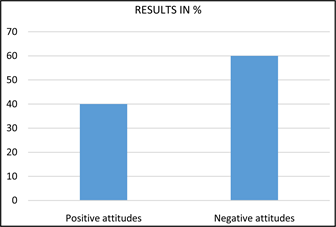
Graphic 1. The attitudes of teachers of Ngozi town towards UPRONA political party in 2021.
That is the displaying of the attitudes of teachers of Ngozi town towards UPRONA political party in 2021. Now we can see the attitudes of health care workers towards the same political party and during the same period.
3.2. The Attitudes of Health Care Workers of Ngozi Town towards UPRONA Political Party in 2021
Ngozi town has one public hospital, one private hospital, one public health center, and a lot of small private health centers and pharmacies. Concerning the health care workers, fifty respondents filled the closed questionnaire. Among them, ten proved to hold positive attitudes towards UPRONA political party, that is 20%, whereas forty revealed negative attitudes towards that political party, that is 80% of all the respondents. Here is how that reality is illustrated by a Table 2 and a Graphic 2.
That is how that reality is highlighted. It is high time we might continue with the attitudes of the administration workers towards UPRONA political party in 2021.
3.3. The Attitudes of the Administration Workers of Ngozi Town towards UPRONA Political Party in 2021
Ngozi town is built in Ngozi district. The administration board comprises workers in various district and province offices located in Ngozi town, and workers of
![]()
Table 2. The attitudes of health care workers of Ngozi town towards UPRONA political party in 2021.
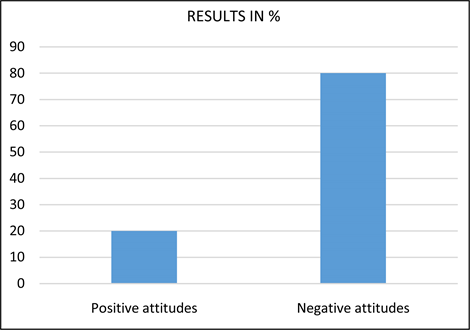
Graphic 2. The attitudes of health care workers of Ngozi town towards UPRONA political party in 2021.
six quarters namely Kinyami, Rubuye, Rusuguti, Muremera, Shikiro, and Gabiro. It has been impossible to contact all of them. So, during this investigation, only fifty agents of the administration of Ngozi town filled the closed questionnaire which had been prepared in the framework of producing this research paper. Among them, five revealed positive attitudes towards UPRONA political party, namely 10%, whereas forty-five showed negative attitudes towards that political party, namely 90% of all the respondents. Here is the Table 3 and Graphic 3 representation of that reality.
That is the way that reality is illustrated. Let us shift to the attitudes of jobless people of Ngozi town towards UPRONA political party in 2021.
3.4. The Attitudes of Jobless People of Ngozi Town towards UPRONA Political Party in 2021
Due to the rural exodus, there are many jobless people in Ngozi town. The majority of them are still very young. When they see that there is no job in their rural native areas, they go to Ngozi town with the hope of obtaining job opportunities there. Such people have qualifications in various domains and at varied levels. This research has also concerned them. On a total of 100 respondents, 25 proved to hold positive attitudes towards UPRONA political party, whereas 75 revealed negative attitudes towards that political party. Table 4 and Graphic 4 representation of that result is as follows.
That is the illustration of that reality. Let us finish with the attitudes of the
![]()
Table 3. The attitudes of the administration workers of Ngozi town towards UPRONA political party in 2021.
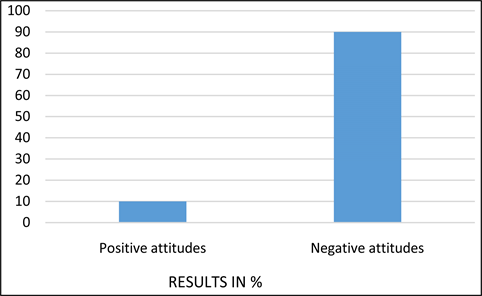
Graphic 3. The attitudes of the administration workers of Ngozi town towards UPRONA political party in 2021.
![]()
Table 4. The attitudes of jobless people of Ngozi town towards UPRONA political party in 2021.
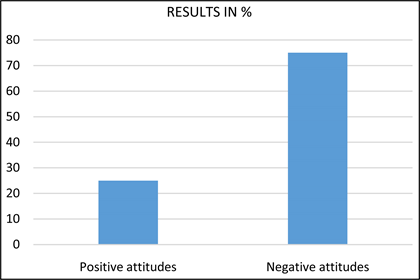
Graphic 4. The attitudes of jobless people of Ngozi town towards UPRONA political party in 2021.
students of Ngozi town towards UPRONA political party in 2021.
3.5. The Attitudes of the Students of Ngozi Town towards UPRONA Political Party in 2021
Ngozi town shelters many students. Some of them study at Ngozi University, and others study at the East African Leadership Institute. Both of them are private higher educational institutions. During this research, it has been possible to reach some of them and they have accepted to respond to the provided closed questionnaire. As Illustrated in Table 5 and Graphic 5, this investigation has shown that the students of Ngozi town hold negative attitudes towards UPRONA political party in general. Here is what has been found: on a total of one hundred students who responded to the questionnaire, seventy-three perceive that party negatively, whereas twenty-seven only see it as an adequate and sustainable political party.
That is what has been found as the attitudes of Ngozi town students towards UPRONA political party in 2021. In the next section, it has been question of a discussion on those results which have been displayed above.
4. Discussion
4.1. Synthesis of the Attitudes Found in the Respondents of Those Five Categories
As it can be read in Table 6 and Graphic 6, On a total of four hundred respondents, one hundred and seven, that is 27%, have revealed positive attitudes
![]()
Table 5. The attitudes of the students of Ngozi town towards UPRONA political party in 2021.
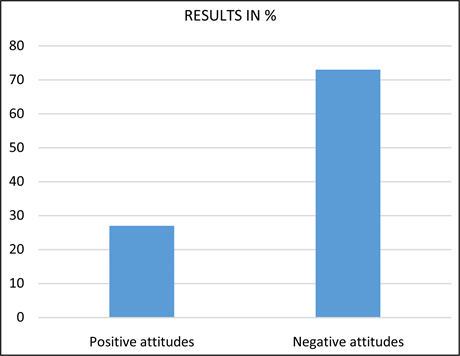
Graphic 5. The attitudes of the students of Ngozi town towards UPRONA political party in 2021.
towards UPRONA political party, whereas two hundred and ninety-three, that is 73%, have shown negative attitudes towards that political party.
That is the overall representation of the results found throughout this research. After this synthesis, let us deal with the discussion on those results.
4.2. Discussion
According to this research which has been carried out on the elites of Ngozi town in 2021, considering the five categories of people who responded to the closed questionnaire which was given, those who revealed more negative attitudes are those who work in the administration (90%), followed by those who work in the health care service (80%); whereas the category of people who show more positive attitudes towards UPRONA political party is that of teachers (40%), followed by that of students (27%). On the average, and concerning all those categories of people who responded to the questionnaire which was provided, that political party is perceived positively at the rate of 27%, whereas it is seen negatively at the rate of 73% in Ngozi town in 2021.
People adopt positive or negative attitudes towards a political party in accordance with the socio-political environment which prevails in the concerned country. Most of the respondents who took part in this investigation see UPRONA political party negatively because they seem to accuse it of being responsible (in
![]()
Table 6. The overall attitudes of the elites of Ngozi town towards UPRONA party in 2021.
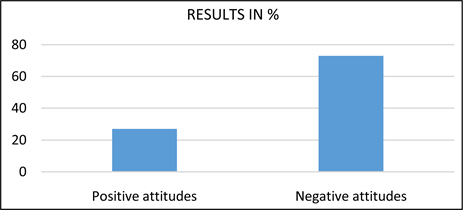
Graphic 6. The attitudes of the elites of Ngozi town towards UPRONA party in 2021.
this research this case was not subjected to investigation) to all the miseries which happened in Burundi in the past, while others take it as the champion of the social, economic, and political progress of Burundi (The initiative of bringing the national unity, the building of roads, schools and hospitals, the setting up and the strengthening of the administrative structure inherited from the Belgian colonial power, the accepting of multipartism, and notably that of the verdict of the 1993 elections, as well as its active and constructive participation in Arusha peace talks). Let us end with general conclusion and recommendations.
5. General Conclusion and Recommendations
In order to produce this research paper whose title is, “The Perception of Ngozi Town Elites Towards UPRONA Political Party in 2021”, the starting point has been the main question, namely, “How do Ngozi town elites perceive UPRONA political party in 2021?” The aim of this research was to discover the extent to which these elites appreciate UPRONA political party. So as to answer that question, a closed questionnaire was used as the major method for this research, and quantitative data were obtained, which have even been presented under the form of tables and graphics. The vertical numbers of those graphics carry the following meanings:
- Graphic 1 means that Ngozi town teachers hold positive attitudes towards UPRONA political party at the rate of 40%, whereas they have negative attitudes towards that political party at the rate of 60%;
- Graphic 2 means that Ngozi town health care workers hold positive attitudes towards UPRONA political party at the rate of 20%, whereas they have negative attitudes towards that political party at the rate of 80%;
- Graphic 3 means that Ngozi town administration workers hold positive attitudes towards UPRONA political party at the rate of 10%, whereas they have negative attitudes towards that political party at the rate of 90%;
- Graphic 4 means that Ngozi town jobless people hold positive attitudes towards UPRONA political party at the rate of 25%, whereas they have negative attitudes towards that political party at the rate of 75%;
- Graphic 5 means that Ngozi town students hold positive attitudes towards UPRONA political party at the rate of 27%, whereas they have negative attitudes towards that political party at the rate of 73%.
By analyzing these results, and as it is the meaning of vertical numbers of Graphic 6, it has been discovered that in 2021, UPRONA political party was negatively viewed by the elites of Ngozi town at the rate of 73%, whereas it was positively perceived by the same elites and in that period at the rate of 27%. This paper has been structured in this way: 1) Introduction, 2a) Ideological foundations of UPRONA political party through its anthem, 2) Method, 3) Results, 4) Discussion, 5) General conclusion and recommendations. This research contributes in pointing out at what extent the elites of an African town can perceive a former ruling political party, with the specific case of Burundi.
Before putting an end to this research paper, it is worth suggesting some guiding thoughts which may be useful to other Burundian researchers who may wish to work on similar topics:
- The perception of the women of Ngozi town towards UPRONA political party;
- The perception of Ngozi businessmen towards UPRONA political party;
- -The perception of the illiterate people of Ngozi town towards UPRONA political party.
This is the end of this research paper. It is expected that these guiding thoughts will be useful to anyone who will need to use them.
Acknowledgements
I would like to thank Professsor Nicodème Bugwabari, Professor Elias Sentamba and Dr. Guillaume Ndayikengurutse, who are all Political Scientists and Lecturers and Researchers at the University of Burundi, for their support in orienting me in research in political science at the Doctoral School of the University of Burundi. I also thank Professor Juma Shabani, Director of the University of Burundi Doctoral School, and Professor Peter Okebukola from Lagos University, for having initiated me in the use of ICT in doctoral research. I also thank Dr. Father Appolinaire Bangayimbaga, Rector of Ngozi University, and Professor Liboire Ngendahayo, Director of Academic Affairs and Scientific Research at Ngozi University, for their daily encouragements.
NOTES
1 Kenny (1994: p. 1) says this: “A person perceives the object, but the object does not perceive the person”.
2 Kelly & Ashiagbor (2011) say that in general, the credibility of democracy depends on the way in which the institutions function in pratice. That credibility is dark in some new democracies, inasmuch as the citizens have benefited less or did not benefit at all from their new governments: the levels of poverty have remained the same, public services remain inefficient, and citizens continue to feel disconnected from their governments.
3In this paper the concept of intellectual is not tackled through gramscian analyses. That term is taken in the popular context of Burundians according to which an intellectual is any person who is able to speak French.
4Here concerning perceptions Terence tells us that judgement is the active mediator between ideas and images. Moreover, as active, or spontaneous, the judgement is not only mediator but also creator of ideas. People do not feel their judgements, but they produce them. https://www.persee.fr/doc/rfsp_0035-2950_1979_num_29_4_418643 Visited on Saturday December 5, 2020 at 10: 08.
5https://www.uantwerpen.be/en/projects/centre-des-grands-lacs-afrique/droit-pouvoir-paix-burundi/partis-politiques/uprona/ Visited on Wednesday September 9, 2021 at 3:30 p.m
6https://www.persee.fr/doc/rfsp_0035-2950_1962_num_12_2_403378 Visited on Saturday December 5, 2020 at 10 0’clock. Bonnafé & Cartry (1962), while dealing with political ideologies of developing countries during the 1960’s, they said this: Facing the emergency of daily problems and the huge number of tasks to be fulfilled now, all the leaders locate their way of acting in accordance with necessary progress. In order to make it accepted a mobilisation of emotions is required: what is to be justified here is the sum of sacrifices and expenses. Doctrines are thus led to put forward the image of the economy and that of the society which ought to be built. p. 420.
7https://elibrary.ru/item.asp?id=5466144 Visited on Thursday September 24, 2021 at 5 p.m.
8It is believed by some people that there were no open conflicts during the Second Republic because the possible opponents had been physically eliminated in 1972.
9A rich man would give to a poor man a piece of land on which that poor man would live with his wife and his children, and this poor man’s family owed faithfulness and other free of charge activities to the rich man’s family.
10A rich man who had lived in harmony with another person would give him a cow as a symbol of their friendship. The beneficiary of the cow would give beer to the elders of the village and to the giver of the cow, when that beneficiary came to show them that gift as a sign of acknowledgement (“Gukura ubwatsi” in Kirundi). However, the cow remained a belonging of the giver. These two explanations were provided by one of the respondents during the investigation for writing this research paper.
11“Le talon d’Achille” (Achille’s heel) is a French phrase to mean the weakness of a person. https://www.linternaute.fr “expression” langue-française Visited on Thursday May 20, 2021 at 5:53 p.m.
12Sunzu, S. Already cited paper.
13https://www.cnrtl.fr/definition/m%C3%A9thodologie Visited on Saturday December 5, 2021 at 11: 37.
14https://halshs.archives-ouvertes.fr/halshs-00842359/Visited on Saturday December 5, 2021 at 11: 28.
15Web site visited on Sunday April 10, 2022 at 8:30 a.m.